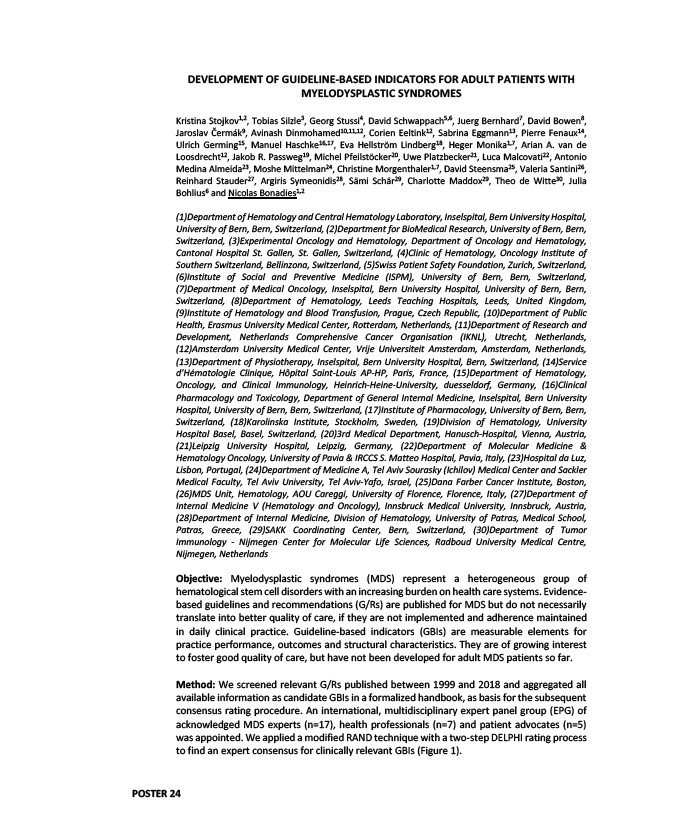
DEVELOPMENT OF GUIDELINE-BASED INDICATORS FOR ADULT PATIENTS WITH
MYELODYSPLASTIC SYNDROMES
Kristina Stojkov1,2, Tobias Silzle3, Georg Stussi4, David Schwappach5,6, Juerg Bernhard7, David Bowen8,
Jaroslav Čermák9, Avinash Dinmohamed10,11,12, Corien Eeltink12, Sabrina Eggmann13, Pierre Fenaux14,
Ulrich Germing15, Manuel Haschke16,17, Eva Hellström Lindberg18, Heger Monika1,7, Arian A. van de
Loosdrecht12, Jakob R. Passweg19, Michel Pfeilstöcker20, Uwe Platzbecker21, Luca Malcovati22, Antonio
Medina Almeida23, Moshe Mittelman24, Christine Morgenthaler1,7, David Steensma25, Valeria Santini26,
Reinhard Stauder27, Argiris Symeonidis28, Sämi Schär29, Charlotte Maddox29, Theo de Witte30, Julia
Bohlius6 and Nicolas Bonadies1,2
(1)Department of Hematology and Central Hematology Laboratory, Inselspital, Bern University Hospital,
University of Bern, Bern, Switzerland, (2)Department for BioMedical Research, University of Bern, Bern,
Switzerland, (3)Experimental Oncology and Hematology, Department of Oncology and Hematology,
Cantonal Hospital St. Gallen, St. Gallen, Switzerland, (4)Clinic of Hematology, Oncology Institute of
Southern Switzerland, Bellinzona, Switzerland, (5)Swiss Patient Safety Foundation, Zurich, Switzerland,
(6)Institute of Social and Preventive Medicine (ISPM), University of Bern, Bern, Switzerland,
(7)Department of Medical Oncology, Inselspital, Bern University Hospital, University of Bern, Bern,
Switzerland, (8)Department of Hematology, Leeds Teaching Hospitals, Leeds, United Kingdom,
(9)Institute of Hematology and Blood Transfusion, Prague, Czech Republic, (10)Department of Public
Health, Erasmus University Medical Center, Rotterdam, Netherlands, (11)Department of Research and
Development, Netherlands Comprehensive Cancer Organisation (IKNL), Utrecht, Netherlands,
(12)Amsterdam University Medical Center, Vrije Universiteit Amsterdam, Amsterdam, Netherlands,
(13)Department of Physiotherapy, Inselspital, Bern University Hospital, Bern, Switzerland, (14)Service
d’Hématologie Clinique, Hôpital Saint-Louis AP-HP, Paris, France, (15)Department of Hematology,
Oncology, and Clinical Immunology, Heinrich-Heine-University, duesseldorf, Germany, (16)Clinical
Pharmacology and Toxicology, Department of General Internal Medicine, Inselspital, Bern University
Hospital, University of Bern, Bern, Switzerland, (17)Institute of Pharmacology, University of Bern, Bern,
Switzerland, (18)Karolinska Institute, Stockholm, Sweden, (19)Division of Hematology, University
Hospital Basel, Basel, Switzerland, (20)3rd Medical Department, Hanusch-Hospital, Vienna, Austria,
(21)Leipzig University Hospital, Leipzig, Germany, (22)Department of Molecular Medicine &
Hematology Oncology, University of Pavia & IRCCS S. Matteo Hospital, Pavia, Italy, (23)Hospital da Luz,
Lisbon, Portugal, (24)Department of Medicine A, Tel Aviv Sourasky (Ichilov) Medical Center and Sackler
Medical Faculty, Tel Aviv University, Tel Aviv-Yafo, Israel, (25)Dana Farber Cancer Institute, Boston,
(26)MDS Unit, Hematology, AOU Careggi, University of Florence, Florence, Italy, (27)Department of
Internal Medicine V (Hematology and Oncology), Innsbruck Medical University, Innsbruck, Austria,
(28)Department of Internal Medicine, Division of Hematology, University of Patras, Medical School,
Patras, Greece, (29)SAKK Coordinating Center, Bern, Switzerland, (30)Department of Tumor
Immunology - Nijmegen Center for Molecular Life Sciences, Radboud University Medical Centre,
Nijmegen, Netherlands
Objective: Myelodysplastic syndromes (MDS) represent a heterogeneous group of
hematological stem cell disorders with an increasing burden on health care systems. Evidence-based
guidelines and recommendations (G/Rs) are published for MDS but do not necessarily
translate into better quality of care, if they are not implemented and adherence maintained
in daily clinical practice. Guideline-based indicators (GBIs) are measurable elements for
practice performance, outcomes and structural characteristics. They are of growing interest
to foster good quality of care, but have not been developed for adult MDS patients so far.
Method: We screened relevant G/Rs published between 1999 and 2018 and aggregated all
available information as candidate GBIs in a formalized handbook, as basis for the subsequent
consensus rating procedure. An international, multidisciplinary expert panel group (EPG) of
acknowledged MDS experts (n=17), health professionals (n=7) and patient advocates (n=5)
was appointed. We applied a modified RAND technique with a two-step DELPHI rating process
to find an expert consensus for clinically relevant GBIs (Figure 1).
POSTER 24